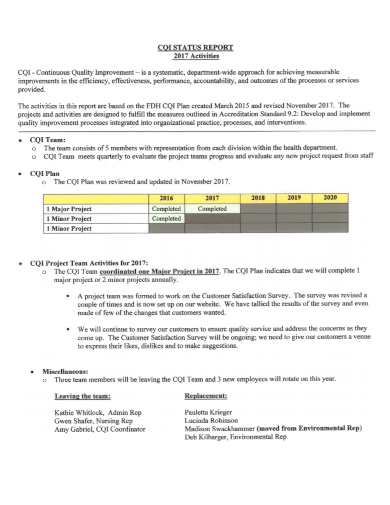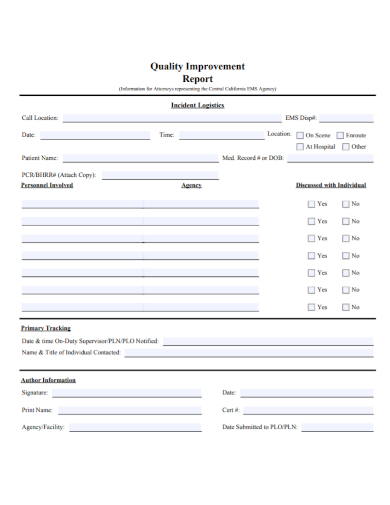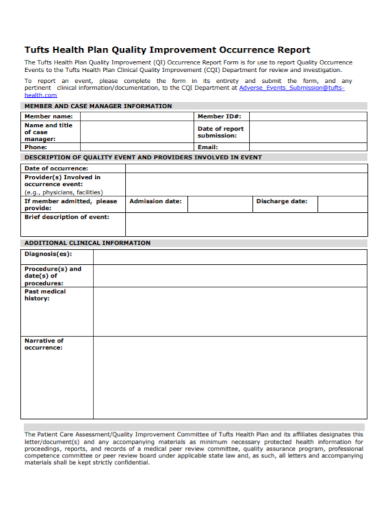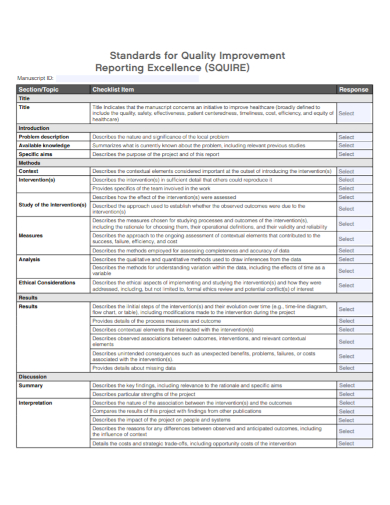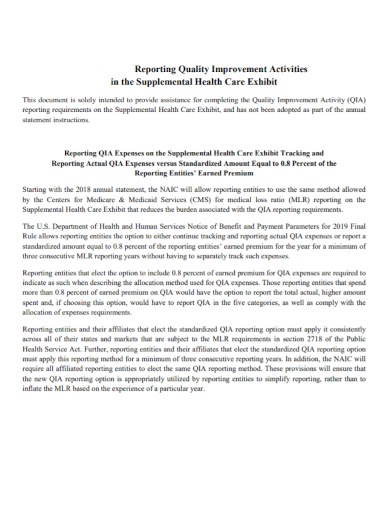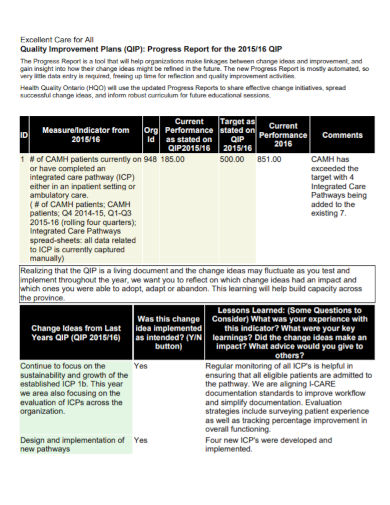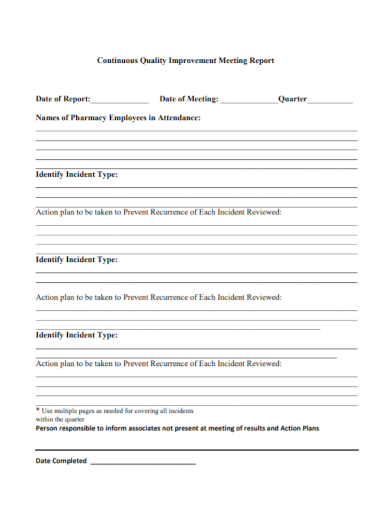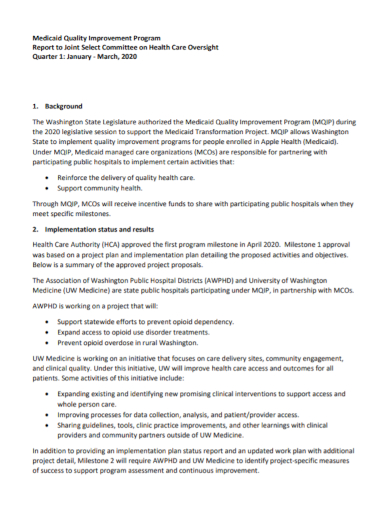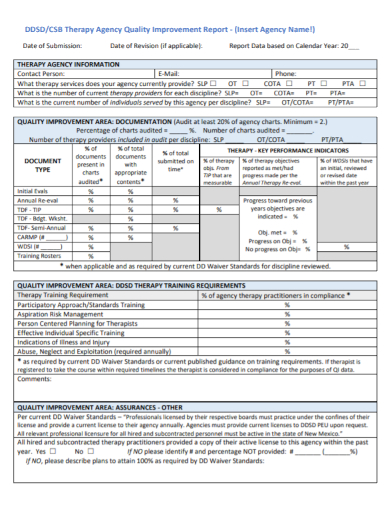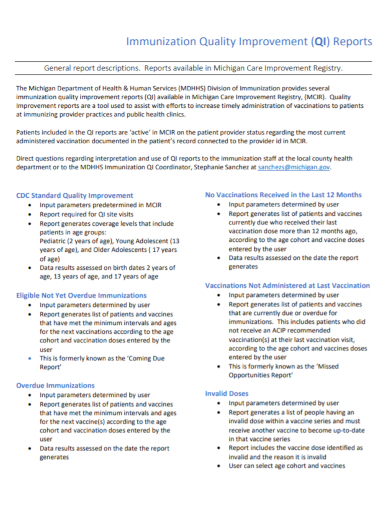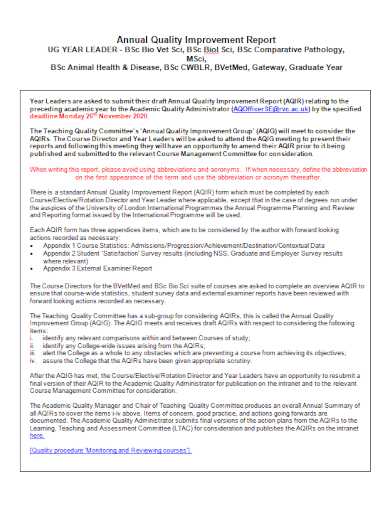Healthcare and medical facilities do a lot of medical practices to help the sick and improve their quality of life. Like any other indusrry in the world, these facilities can fall short on providing the best treatment and technology sometimes. That’s why it’s important to conduct a quality improvement assessment to help pave the way for innovations to cure untreatable illnesses, providing efficient procedures in medical services, supply equipment and tools to improve operations in medical facilities. In this article, we will discuss on how to create a quality improvement report and provide you some sample report templates below.
10+ Quality Improvement Report Samples
1. Continuous Quality Improvement Status Report
2. Quality Improvement Report
3. Health Plan Quality Improvement Report
4. Quality Improvement Excellence Report
5. Quality Improvement Activity Report
6. Quality Improvement Plan Progress Report
7. Continuous Quality Improvement Meeting Report
8. Medicaid Quality Improvement Program Report
9. Therapy Agency Quality Improvement Report
10. Immunization Quality Improvement Report
11. Annual Quality Improvement Report
What is Quality Improvement?
Quality improvement (QI) is a systematic approach of analyzing the current performance of an organization and addressing any issues around it in order to improve the performance. A quality improvement is usually done in healthcare facilities such as hospitals, hospices, medical laboratories, or clinics.
Writing a quality improvement report to a quality improvement plan is like writing an action plan report; it involves an overview of the problems that need to be resolved, a background of the problem and other aspects related to it, and a list of action to be taken to address the problem.
How to do a Quality Improvement Report
Determine the areas that need improvement
You will need to identify and understand in what areas in your practice (e.g. operations, patient population, etc.) that needs to be improved. If you’ve identified these areas, make an outline of the problem. Once you problem has been identified, list down the data you need for your investigation.
Some examples of problems within medical practices are:
- Chronic or rampant illnesses that has hospitalized many victims
- Management issues
- Poor performance and customer dissatisfaction
- Risks and incidents in the environment
- Customer complaints regarding to inability to access medical services
Analyze the Data You Collected
You need to collect all the necessary data that will guide you on resolving the problems you identified earlier. To know that the data you’ve collected is essential for your quality improvement report, it must help you understand how your systems work in your facility, determine any possible areas for improvement, use the data as a basis to make measurable goals and monitor any changes.
Don’t forget to explain your process and method of how you gathered your data. Mention all your sources, including your respondents in your interviews or surveys, and the medical records and data you’ve gotten information from.
Mention also your method of analyzing your collected data. From there you can draw your conclusion on how to improve the quality of the problem identified and then make a performance target or measurements for improvement based on your conclusion. Your conclusion will be the basis of the actions needed to do to create changes.
Share Your Efforts to Everyone in the Medical Facility
Once you’ve completed your quality improvement report, share your findings to your staff, physicians, nurses, and even patients. Communicate to them on the activities needed to do to implement the changes, their roles and responsibilities, and the resources needed for the changes you’ve proposed in your report. Once your project is successful, don’t be shy to acknowledge its success. Allow everyone to share your success to other people.
Continue to Evaluate Your Improvement
Even if you’ve implemented improvements in the qualities of your services, don’t be complacent with it. Continue to evaluate the progress of its performance, assess the effectiveness of your changes by asking for feedback.
FAQs
What are the main principles of quality improvement?
The four main principles of quality improvement are consumer focus, leadership, process approach, evidence-based decision making, and improvement.
What are the 5s in quality improvement?
The 5S in quality improvement stands for sort, set in order, shine, standardize, and sustain.
What are the quality improvement tools?
Thes tools that help easen the quality improvement process are flowcharts, histograms, check sheets, control charts, Pareto bar charts,cause and effect diagrams, and scatter diagrams.
Properly implementing quality improvement to your services and operations can boost better and safer practice and efficient processes, effective clinical outcomes in your facility. Furthermore, it helps you equip with the necessary skills and tools for national recognition programs and participate in public reporting of healthcare data. To help you get started, refer to the quality improvement report templates provided above. They are all free to download so you can download as many templates as you can!
Related Posts
FREE 12+ Sample Evaluation Forms
FREE 11+ Laboratory Audit Report Samples
FREE 11+ Management Audit Report Samples
FREE 10+ Sample Performance Plan
FREE 10+ School Visit Report Samples
FREE 9+ Quality Engineer Job Description Templates
FREE 9+ Sample Restaurant Proposals
FREE 8+ Sample Job Evaluation Reports
FREE 8+ Value Analysis Samples
FREE 10+ Sample HR Metrics
FREE 10+ Classroom Observation Report Samples
FREE 10+ Consultant Report Samples
FREE 10+ Employee Performance Evaluation Report Samples
FREE 10+ Retail Gap Analysis Samples
FREE 10+ Business Research Report Samples

